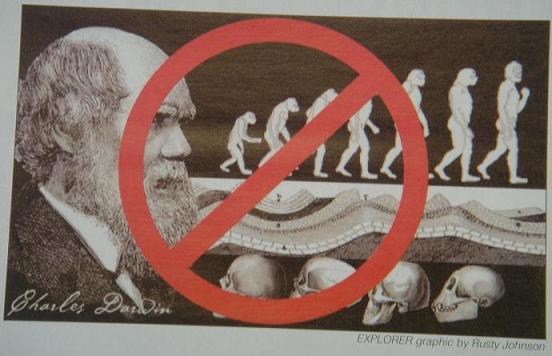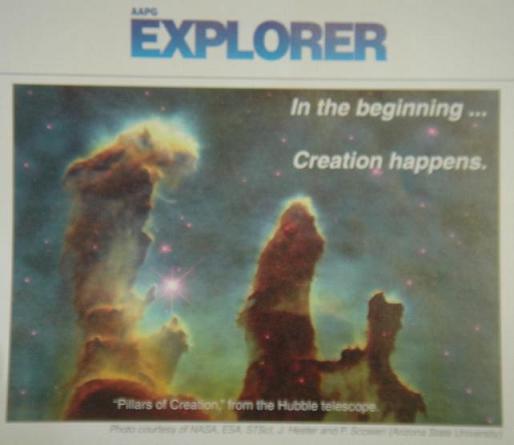
Science is about to lose the public debate between evolution and creationism in
the United States.
Here are five reasons why:
- Public support for creationism has been growing steadily while belief in
evolution declines.
According to the results of a Harris Interactive Poll released in July, 54 percent
of U.S. adults do not think human beings developed from earlier species, compared
to 46 percent in March 1994.
In the same period, the number of adults who belive humans developed from earlier
species dropped from 44 percent to 38 percent, according to the poll.
- The creationist movement is well funded, politically savvy and extremely
well organized.
Creationism draws support from national organizations, including the Institute for
Creation Research in California, the Discover Institute in Seattle and answers in
Genesis in Kentucky.
"They have a very effective public relations machine. We're doing everything ad hoc,
with no budget" said AAPG member Lee Allison, an evolution supporter and former
Kansas State Geologist who chairs the Kansas State Energy Council.
Also, dozens of community-based, grassroots creationist groups across the United
States are working to thwart the teaching of evolution in public schools.
- Creationists have shown the patience for the long, slow process of changing
the perspective of th courts.
Legal rulings against teaching creationism in public schools and placing evolution
"warning stickers: on textbooks caused problems for creationists.
As the courts evolve towards more conservative and less secular, judicial decisions
may become, and probably will become, more favorable to the creationist outlook.
- Creationists now use the broadest possible public media to promote their beliefs.
In the United States, support for creationist ideas is broadcast 24 hours a day, seven
days a week, on religion-based television and radio networks.
At best, scientific explanations of evolution are broadcast from 4:30 p.m. every other
Saturday, on a UHF station from your local college.
- Pro-creation forces have introduced the concept of fairness in science teaching,
arguing that schools should teach all viewpoins on biological development.
That tactic is working brilliantly.
In the Harris poll of 1,000 U.S. adults, 23 percent said public schools should teach
only creationism, while 12 percent said schools should teach only evolution.
But a substantial majority, 55 percent, said schools should teach all views:
evolution, creationism and Intelligent Design (ID).
That group, according to a Knight Ridder Newspaper report, includes the president
of the United States.
"I think that part of education is to expose people to different schools of
thought," President George Bush added at an Aug. 1 question-and-anser session
with the media at the White House.

Intelligent Design
"Intelligent Design, as far as I can tell, is really a gussied-up version of
an idea that was first presented in the 19th century," said Les McFadden, chair
of the Departmentof EArth and Planetar Sciences at the University of New Mexico
in Albequerque, N.M.
ID supporters would say "if you found a watch, after even a cursory examination
you'd know it must have been created,: he said.
In the same way, proponents of ID claim that life is so complex, it could not
have occurred by accident and without design.
Critics of ID see it as an atempt to put a scientific and non-religious face
on creationist ideas - an effort to bring creationism back into public school
classrooms under a different name.
When ID proponents speak in public, "they say, 'We don't know who the
intellingent designer is, and it's not really important,'" McFadden observed.
"Well, they're being totally disingenuous," he added. "I don't think they're
being honest about their deeper belief."
Keith Miller, a research assistant professor in the Department of Geology at
Kansas State University, holds deeply fundamentalist Christian beliefs.
He's a sharp critic of creationism and ID, even thoug he believes the universe
is the direct creation of a divine creator.
"That is aperfectly legimate theological understanding, and one that I share.
That's something not necessary in the scientific understanding. I believe that
God is involved at all times," he explained.
"Then tere is the idea that God intervenes to interrupt cause-and-effect processes,"
he said. "Ultimately, that is where the problem is."
According to its critics, ID operates along the following lines:
- ID proponents spread their ideas through books and in papers published almost
exclusively outside of peer revviewed journals.
- They often pursue obscure arguments that link several subjet areas, for instance,
biology, paleontology and information theory.
- When mainstream science hasn't offered a complete explanation for a specific
phenomenon, supporters of ID offer that as an indication of divine intervention.
Critics call this approach "the God of the Gaps."
"They are essentially looking for gaps in our current scientific understanding and
then using them as evidence of divine action. That is an effort that has failed,
historically," Miller observed.
"o say on principle that something cannot be explained is really deferring to our
ignorance. Most of the specific critiques the intelligent design community have
provided have been thoroughly debunked," he said.
Scientists opposed to ID also see it as undermining the public's opinion of and
understanding of science.
"What it really comes down to, and what they want to incorporate in public
education, is this idea that science is atheistic and naturalistic," Miller said.
"They are pulling the rug out from under the fundamental methodologoy of science."
McFadden agreed.
"I simply say this: Intelligent Design, no matter what else you may think,
ultimately relies on supernatural intervention and not science," he said.
"What they're trying to do, he added, "is change the epistemology of science
from naturalism to saying, 'Why don't you let the supernatual into scientific explanations?'"
Creationism in Kansas
Michael Padilla, an administrator at the University of Georgia, currently serves as
president of the National Science Teachers Association.
He believes the resurgence of creationism is a major problem for science teachers
in the United States.
"I think it's a big problem because these nouveau-creationists are working at the
policy level in Kansas and other places," he said. "Their arguments are becoming
more refined.
Calls for fairness in teaching evolution and opposing concepts present an especially
difficult challenge for educators, according to Padilla.
"The problem is that many Americans who don't have a scientific background resonate
with this fairness idea. And I don't think we are handling it very well," he said.
"I think it appeals to the basic American ideal of fairness. It appeals to the
public belief that there is a God, and that God created the world," he added.
Padilla worries that evolution supporters take the wrong approach when they respond
to creationists with confrontation, rebuke and even ridicule.
"That's the wrong way to do it," he said. "You just can't be in everbody's face
like that."
Creatopmosts gained a majority on the Kansas State Board of Education and tried to
change he state's standards for school classes in the late 1990's.
That attempt came to halt when they lost the majority in the subsequent school
board election.
"They're pouring a lot of resources into Kansas because they see us as being kind
of a bellweather. It's heartland America," Allison said.
"If they can get this through here, they can use it as kind of a model for the rest
of the country," he added.
Allison said each of 10 geographical districts in Kansas elects a representative
to the school board. The 10 members serve four-terms, with half elected every two years.
"In 2002, a couple of candidates ran very low-profile races and upset incumbent,
pro-science board members," he said, and in 2004, more vocal and open supporters of
creationism won seats.
Consequently, creationists regained majority control of the board.
"Since then, they've pretty much publicly laid out their plan, and they're stepping
through it," Allison said.
The school board appointed a committee to revise the state's science standards for
schools, and the new standards were reviewed nationally with very favorable feedback
to Allison.
At that point, the board rejected the standards proposed by its own committee and
decided to hold hearings on the issue of teaching evolution, he said.
Leading scientists, creationists and ID proponents were invited to give testimony and
answer questions, Allison said.
The mainstream scientists didn't show up.
"WE boycotted, and we convinced everyone around the state and the nation to boycott,"
Allison said.
Many felt the hearings were an attempt "to prove that evolution is a science in crisis,"
opening the door to teaching opposing views, he explained.
"The scientific community decided there was no use going there. They (creationists)
already have the votes on the school board," Miller said.
Evolving Viewpoints
Today's situation in Kansas leaves evolution supporters hoping for a reversal in the
2006 school board elections.
Recently, the board decided to vote on new science starndards at its October meeting
and also chose to define evolution as an unguided process, according to Allison.
"They've redefined science with their definition, which is that evolutino is
unguided. When you define evolution as unguided, you deny the religious belief of
many people who believe that nature is guided by the hand of God. That's a fairly
radical step," he noted.
"When you talk to some of the really conservative board members, they say you can't
accept evolution and believe in God at the same time," he said.
Creationists often refer to evolution science as Darwinism or neo-Darwinism,
painting it as antithetical to Christian beliefs. They argue that evolution should
never be taught as scientific fact.
An example of that approach appeared in a newspaper opinion piece,"Teach the
Controversy," written by Rick Santorum and published earlier this year.
"In the science classroom, public schools should not teach intelligent design
and they should certainly not teach biblical creationism," Santorum wrote.
But, he noted, "Darwin wrote about his theory of evolution at a time when
evidence was weak.
"In recent years, evidence of the complex circuits, miniature machines, sophisticated
feedback loops and digital information inside the cell has enabled scientists to poke
holes" in evolution science, Santorum stated.
"For all these reasons, Darwin's theory of evolution shold not be taught as absolute
fact in the science classroom," he wrote.
Santorum, of course, is neither a scientist nor an educator, but is a U.S. senator
from Pennsylvania who holds an M.B.A.
Another evolving viewpoint of creationism is the belief in subtle guidance.
In this view, God has subtly but directly intervenedin the history of life for a
specific purpose, including he development of hman beings.
Cardinal Christoph Schonborn, a leading Catholic theologian, seemed to embrace
both intelligent design and divine guidance in an article published in the New
York Times in July.
"Evolution in the sense of common ancestry might be true, but evolution in the
neo-Darwinian sense - an unguided, unplanned process of random variation and
natural selection - is not.
"Any system of thought that denies or seeks to explain away the overwhelming
evidence for design in biology is ideology, not science," he wrote.
Long-Term SolutionMany scientists ignore the conflict between evolution and creationism, saying
"This debate has nothing to do with science Why should scientists be involved?"
In the end, science can't distance itself from popular debates.
Whether or not genetics is subject to divine intervention, there's a growing
conflict over human intervention. Think genetically altered plants, stem-cell
research and cloning.
And the creationism controversy plays into a broader, ongoing debate in science,
between gradualism and various concepts of catastrophism.
Miller, the mainstream scientist and unsweving Crhistian, believes a better
public understanding of science will provide the anwer.
"That is where my optimism lies. There is a way to move forwrd, and that
way is better education," he said.
"That's not a six-month solution, or even a five-year solution," he added.
It's the long-term solution."
For Further Investigation ... The following Web sites contain information related to evolution, creationism and intelligent design:
| For more information on this subject, visit the AAPG Web site. www.aapg.org |
. . .
|